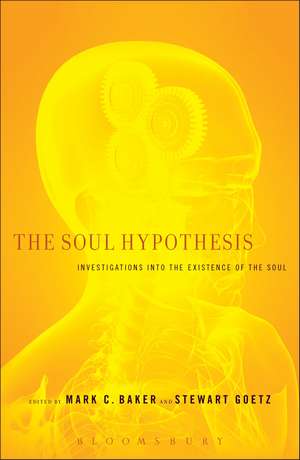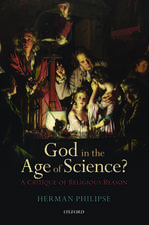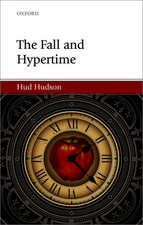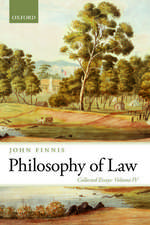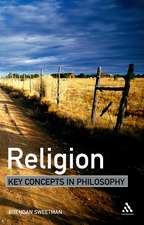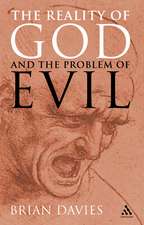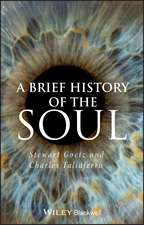The Soul Hypothesis: Investigations into the Existence of the Soul
Editat de Professor Mark C. Baker, Professor Stewart Goetzen Limba Engleză Paperback – 16 feb 2011
Preț: 118.51 lei
Preț vechi: 192.80 lei
-39% Nou
Puncte Express: 178
Preț estimativ în valută:
22.68€ • 24.65$ • 19.07£
22.68€ • 24.65$ • 19.07£
Carte tipărită la comandă
Livrare economică 21 aprilie-05 mai
Preluare comenzi: 021 569.72.76
Specificații
ISBN-13: 9781441152244
ISBN-10: 1441152245
Pagini: 304
Dimensiuni: 138 x 216 x 18 mm
Greutate: 0.42 kg
Editura: Bloomsbury Publishing
Colecția Continuum
Locul publicării:New York, United States
ISBN-10: 1441152245
Pagini: 304
Dimensiuni: 138 x 216 x 18 mm
Greutate: 0.42 kg
Editura: Bloomsbury Publishing
Colecția Continuum
Locul publicării:New York, United States
Caracteristici
Fresh look at the conflict between the practice of science and belief in the soul
Notă biografică
Mark C. Baker is Professor of Linguistics and Cognitive Science at Rutgers University, USA. He is the author of five books, including The Atoms of Language (Basic, 2001) and The Syntax of Agreement and Concord (Cambridge, 2008).
Stewart Goetz is Ross Frederick Wicks Distinguished Professor in Philosophy and Religion at Ursinus College, PA, USA. He is co-author with Charles Taliaferro of Naturalism (Eerdmans, 2008) and A Brief History of the Soul (Blackwell, 2011). He serves on the board of directors for Blackwell's Philosophy Compass.
Stewart Goetz is Ross Frederick Wicks Distinguished Professor in Philosophy and Religion at Ursinus College, PA, USA. He is co-author with Charles Taliaferro of Naturalism (Eerdmans, 2008) and A Brief History of the Soul (Blackwell, 2011). He serves on the board of directors for Blackwell's Philosophy Compass.
Cuprins
Introduction1. "The Soul of the Matter" - Charles Taliaferro2. "Minds, Brains and Brains in Vats" - Daniel N. Robinson3. "Brains and Souls; Grammar and Speaking" - Mark Baker4. "Making Things Happen: Souls in Action" - Stewart Goetz5. "Energy of the Soul" - Robin Collins6. "The Measure of All Things: Quantum Mechanics and the Soul"- Dean Zimmerman7. "From Seeing to Seer" - Hans Halvorson8. "Souls Beastly and Human" - William Hasker9. "A Scientific Case for the Soul" - Robin CollinsAfterwordBibliography
Recenzii
"Baker and Goetz have assembled an impressive interdisciplinary team of scholars to address questions about the existence and nature of the soul. The book is unique is combining philosophical and scientific arguments for dualism, and the result is a rigorous, exciting, persuasive presentation of the issues. The Soul Hypothesis is an excellent text that is sure to provoke a vigorous dialog about its content. I highly recommend it." -- J. P. Moreland, Distinguished Professor of Philosophy, Biola University, USA, and author of Consciousness and the Existence of God (Routledge, 2008)
"The Soul Hypothesis is a refreshingly open-minded collection of new essays, all of them philosophically and scientifically well-informed, demonstrating that soul-body dualism is far from being a defunct hypothesis and, indeed, is in many respects more promising than any of the forms of physicalism that have come to dominate western philosophy in recent decades. It is unusual in approaching its topic from a wide variety of angles, including those of linguistics and modern relativistic and quantum physics. Without ever sacrificing rigor, the contributors set out their case for the soul in a clear and accessible way, which will make this volume exciting reading for both specialists and non-specialists, whether their background is in philosophy, science, or theology. The editors do a first-rate job of tying the essays together and providing a general framework for understanding the key issues at stake." -- E.J. Lowe, Professor of Philosophy, Durham University, UK.
"Sooner or later, the contributors to The Soul Hypothesis warn, scientists will pinpoint the exact three neurons whose firing accompanies the thought of our deciding to make a phone call or, if you prefer, deciding to get up and get a beer from the refrigerator. As ever more such micro-couplings are observed, we will-so scientists tell us with unseemly glee-gradually come to see that our cherished conscious life is nothing but a long series of electrical impulses, not an autonomous realm of free will and free thought. [...] The book's contributors set out this scientific challenge fully and engagingly, but they also expose its fallacies.The Soul Hypothesis performs yeoman service in rescuing the human capacities for consciousness and voluntary action from scientific challenge." -- The Wall Street Journal
"This is a book that all philosophers of mind, from senior undergraduates up, should read. Some of the material in the scientific pieces came as revelations to me and help undermine the current presumption that scientific naturalism is the educated option -- even physical science does not really support it." -- Notre Dame Philosophical Review
"Overall, The Soul Hypothesis is a timely, well-conceived and well-argued work with excellent contributors and a good mix of philosophy, fundamental physics, and neuroscience... in its main aim-rehabilitating the soul as a necessary inhabitant of the scientific world-The Soul Hypothesis is a great success, and highly recommended." - Christian Research Journal
This user-friendly work has fairly extensive introductions for each contribution, a thorough introduction and conclusion to the overall project, and ample chapter notes. Summing Up: Recommended. Lower-level undergraduates and above; general readers.
"The Soul Hypothesis is a refreshingly open-minded collection of new essays, all of them philosophically and scientifically well-informed, demonstrating that soul-body dualism is far from being a defunct hypothesis and, indeed, is in many respects more promising than any of the forms of physicalism that have come to dominate western philosophy in recent decades. It is unusual in approaching its topic from a wide variety of angles, including those of linguistics and modern relativistic and quantum physics. Without ever sacrificing rigor, the contributors set out their case for the soul in a clear and accessible way, which will make this volume exciting reading for both specialists and non-specialists, whether their background is in philosophy, science, or theology. The editors do a first-rate job of tying the essays together and providing a general framework for understanding the key issues at stake." -- E.J. Lowe, Professor of Philosophy, Durham University, UK.
"Sooner or later, the contributors to The Soul Hypothesis warn, scientists will pinpoint the exact three neurons whose firing accompanies the thought of our deciding to make a phone call or, if you prefer, deciding to get up and get a beer from the refrigerator. As ever more such micro-couplings are observed, we will-so scientists tell us with unseemly glee-gradually come to see that our cherished conscious life is nothing but a long series of electrical impulses, not an autonomous realm of free will and free thought. [...] The book's contributors set out this scientific challenge fully and engagingly, but they also expose its fallacies.The Soul Hypothesis performs yeoman service in rescuing the human capacities for consciousness and voluntary action from scientific challenge." -- The Wall Street Journal
"This is a book that all philosophers of mind, from senior undergraduates up, should read. Some of the material in the scientific pieces came as revelations to me and help undermine the current presumption that scientific naturalism is the educated option -- even physical science does not really support it." -- Notre Dame Philosophical Review
"Overall, The Soul Hypothesis is a timely, well-conceived and well-argued work with excellent contributors and a good mix of philosophy, fundamental physics, and neuroscience... in its main aim-rehabilitating the soul as a necessary inhabitant of the scientific world-The Soul Hypothesis is a great success, and highly recommended." - Christian Research Journal
This user-friendly work has fairly extensive introductions for each contribution, a thorough introduction and conclusion to the overall project, and ample chapter notes. Summing Up: Recommended. Lower-level undergraduates and above; general readers.
